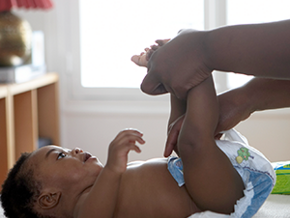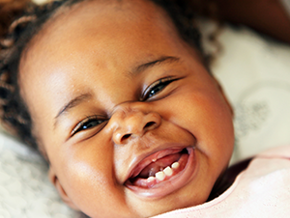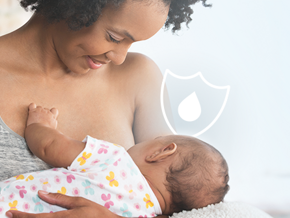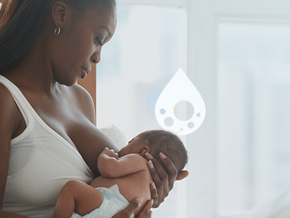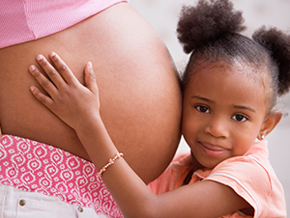
Sleepy-time tips
Since you can't take your eyes off your newborn anyway, you'll notice that, even though his eyes are closed, there's rarely a dull moment. Dreaming, irregular breathing and twitching are all part of his active sleep—which makes up most of his downtime right from the start.
Until your baby starts sleeping more soundly (Older = Deeper Sleep), you can help him sleep by putting him down at the same time every night and following the same bedtime rituals. Soft background noise, like a fan, gentle music or a ticking clock can also help him get a restful sleep.
Wait until 3 months to start teaching him to fall asleep on his own by putting him in the baby cot when he's still drowsy, not yet sound asleep.
Newborns to 3-month-olds
When does baby sleep?
Leave this one to nature. When your newborn needs sleep, he'll sleep. You don't need a schedule, or to try to get him to sleep through the night, for at least the first three months. If he starts feeding more during the day, it could be an indication that he's storing up food to sleep longer at night.
How much sleep?
Your baby needs between 16 and 18 hours of sleep a day. Like most newborns, he'll probably wake up every 2 to 3 hours (even at night), but go back to sleep pretty much right after he feeds. Don't fret, it just means he's comfortable and getting enough to eat. At about 2 weeks, newborn sleep patterns change and you'll notice longer periods of sleeping and wakefulness.
What can I do?
Provide your newborn with a sense of security that you're there for him when he wakes. (Day, night, whenever!)
Remember, "sleeping through the night" means sleeping for five and a half uninterrupted hours between 11 p.m. and 8 a.m. (Some start at 2 months, others may be 9 months or older.)
Keep his room dark and quiet at night, and try to stimulate him only during the day.
Take comfort knowing it is common for your baby to seem like he has his days and nights mixed up in the first few weeks.
Prepare to have a baby basket, bassinet, cradle or play area ready in case your baby isn't comfortable in a baby cot.
Always put your baby down on his back to help reduce the risk of sudden infant death syndrome (SIDS).
3 to 6-month-olds
When does baby sleep?
Believe it or not, life becomes more predictable around the 4-month mark as your baby may start sleeping through the night, while tossing in a few naps during the day.
Your baby may wake up once in the night to be fed.
How much sleep?
Your baby will likely need 3 naps of various lengths. (They actually help the baby to sleep through the night!)
What can I do?
Make sure your baby gets his night feeding as well as your attention. Your baby may be crying for a reason other than hunger and you'll want to reassure him.
Continue to give your baby a chance to learn "self-comforting" (and increase the chances of falling asleep on his own through the night) by putting him down when he's sleepy but still awake.
7 to 12-month-olds
When does baby sleep?
With life even more in order, your baby may now be sleeping through the night and be fine with a couple of scheduled naps.
How much sleep?
Your baby should now sleep between 8 and 10 hours a night, and about 15 hours a day.
Don't rush back to your baby's room if he cries (unless of course he's sick), to give him time to fall back asleep on his own.
Only go check on him if his crying lasts a few minutes, and it's best not to pick him up right away. (Rubbing his tummy and whispering or humming a familiar song can help relax him back to sleep!)
Make sure your cot is sturdy enough to handle his newfound strength (after all he is almost sitting, or even standing, on his own).
Adjust the height of his cot mattress to foil any of his attempts to climb out.
Toddlers
Somewhere between 12 and 18 months, your toddler will probably attempt to switch from two naps to one nap, in addition to sleeping all night.
Napping's Benefitzzz…
So, napping can give you time to rest, get an extra load of housework in, or even catch up on your favourite TV show but what does it do for your baby?
- Sleeping allows your toddler to rest and restore himself.
- Brain development: Your toddler will wake up happier, more alert and even more ready to learn.
In case your curious toddler wants to practice mastering new skills in favour of sleep, try these naptime tips:
- Keep a consistent sleeping location. (Day and night!)
- Simulate nighttime during naps (Picture a dark, quiet room with soft music).
- Make naptime the same time each day (like a half hour after playtime or after lunch).
- Start a countdown, "10 more minutes and it's time to lie down."
- Slow his roll before naptime with quiet play, reading or easy listening.
- Avoid letting him sleep in the car or stroller (anything that'll disrupt his schedule).
- Schedule early afternoon naps if you can, anytime before 3 or 4 o'clock.
Counting the hours
| Age | Number of naps | Length of time | Nighttime |
| 12 months | 1-2 | 2-3 hours | 7-9 hours |
| 2 years | 1 | 1-2 hours | 10-12 hours |
Watching for sleepy signals
Don't wait! Start your nap routine at the first sign of tiredness (Crankiness leads to sleeplessness).
Your toddler will give you these sleepy cues:
- Decreased activity and lower energy levels.
- Quieting down.
- Losing interest in people or toys.
- Rubbing eyes, or 'glazing over'.
- Fussing.
- Yawning.
- Laying down.
- Finding his blanket or cuddly teddy bear.
- Asking for a pacifier .
Embracing quiet time
When your baby's second nap has worked its way out of your routine, replace it with some quiet time so he still gets the restful break he needs.
How can you help quiet time fly by? Give your toddler some alone time with a picture book, his blanket, his teddy—any of his favourites that will keep him calm.
Before you know it, your toddler will be 2, and he'll probably be ready to relax after lunch. Take advantage by reading him a story to get him settled for a nap. Whether he sleeps or not, the relaxation and change of pace are just two gentle ways to provide him with some much-needed rest.

